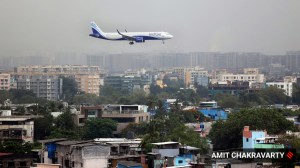Stay updated with the latest - Click here to follow us on Instagram
Spotlight: Dharavi’s dilemma caught between unfulfilled promises and cash crunch
Commerce in Asia's largest slum sprawl has taken a deep hit from the BJP govt's demonetisation move, but the non-starter Dharavi Redevelopment Project makes voters suspicious of other parties too
 Around 500 tonnes of dry waste come to Dharavi daily for recycling. The industry is working mostly on credit post demonetisation. Ganesh Shirsekar
Around 500 tonnes of dry waste come to Dharavi daily for recycling. The industry is working mostly on credit post demonetisation. Ganesh Shirsekar
BARRING THE 1995 Assembly elections, the slum sprawl of Dharavi in central Mumbai had been a Congress bastion since 1980. Even just a decade ago, in the 2007 municipal elections, the Congress won four out of six electoral wards that were part of Dharavi, losing one to the Shiv Sena and one to the Bahujan Samaj Party. In 2012, the Congress received a shocking setback, retaining only one corporator in the area. In 2014, even as the Congress’s traditional support in Mumbai’s slums continued to wane, the party managed to retain the Assembly seat with former Maharashtra minister Varsha Gaikwad surviving in Asia’s largest slum, though her father Eknath Gaikwad lost the general election that summer.
Watch What Else Is Making News
With less than two months to go for elections to the Brihanmumbai Municipal Corporation (BMC), the deep discontent against demonetisation in Dharavi, known to be a hub of small-scale manufacturing units that operate almost entirely on cash, offers the Congress a chance to claw its way back into its former bastion. The only problem, though, is that the Shiv Sena, whose corporator Rahul Shewale posted a huge win over Eknath Gaikwad in the Lok Sabha Assembly election from South Central Mumbai, will be tapping the same dark mood in Dharavi.
“It has affected all small-scale industries in Dharavi. Many people have lost their jobs and unemployment has increased. The people are not able to run their businesses on small transactions. Many places are also not being rented out, they are lying vacant. There is unrest among the people. We are talking to the people about demonetisation, holding meetings with them,” says Varsha Gaikwad.
Spread across 217 hectares in the very heart of Mumbai, with an estimated population of 7 lakh people, Dharavi faces the usual civic challenges common to Mumbai’s slums — poor sanitation, inadequate water connections, potholed roads, below par social amenities including schools, hospitals and playgrounds. But the subject of discussions at street corners, even as political parties begin to assess the mood and begin discussing candidate selection, is only the impact of demonetisation.
“Until October end, I had a thriving business with 20 labourers producing leather jackets and 15 others working on leather bags,” says Hasnain Rauf Shaikh who runs Sana Leathers, a popular store for leather goods in Dharavi. “Apart from supplying to my own store, I also sell to various clients such as banks and others. Now I just have six workers left, to work on an occasional single order,” he says. Right in the middle of the festive season, when orders for year-end gifting items such as wallets are usually pouring in every day, his leather goods production unit is almost at a standstill for the second month running.
Dharavi’s labourers including skilled labourers, are mostly migrants from Bihar and Uttar Pradesh, and they are struggling to survive in an expensive city. Mohammad Shabeer Abdul Qayyum (43), a tailor from Muzaffarpur in Bihar, has been making leather jackets for factories for the last 15 years but is now struggling to earn enough for his family of five including two sons and a daughter. “I gave up farming to earn enough for my family but am not able to pay the bills anymore. Instead of a usual monthly salary of Rs 11,000, I only get Rs 3,000 now. In order to make ends meet, I had to remove my children from a private school and had to enroll them in the municipality school till our financial condition improves,” he says. Qayyum says several others from villages in Bihar, who migrated to Dharavi to earn a better living, are struggling now, some having returned home.
Owners of various trades say the effects of demonetisation have trickled down to impact an entire supply chain. A businessman who employed 30 people manufacturing schools bags earlier is now left with eight-odd workers, and is unable to even pay their full wages. “Our production is down by 70 per cent and our profits have halved. After paying rent for the factory, my personal expenses such as children’s school fees, my household expenses and purchase of raw material, there is barely any money left to pay the workers,” he says. He had to retrench them, at least temporarily, knowing well how many dependent families his action would affect.
But elections bring around one more subject, that of the long-delayed Dharavi Redevelopment Project, dredged out and dusted off to present to voters in the slum before every election.
MLA Varsha Gaikwad believes the project will remain a non-starter again, this time owing to the impact of demonetisation. “Earlier, despite several attempts, no bid from private players was received. After diluting many clauses suggested by builders, the state government has divided the project into small divisions. I’m doubtful whether it will receive any response from builders in the current market scenario,” she says, adding that she’s batting for the project to take off at the earliest.
Baburao Mane, former Sena legislator from Dharavi who won in 1995, says he is talking to voters about his fight to garner larger houses for them in the redevelopment deal. “We have fought a long battle for them and will continue to fight. We are placing facts about the project before people at meetings,” says Mane.
But back in the commercial units of Sanaullah Compound, 13th Compound and Shakur Compound, business owners are unconvinced about the re-development project, hanging fire since at least 2003.
Hariram Tanwar, secretary of the All Plastic Recyclers Association, opposes the idea altogether. “We need a lot of space for the grinder and additional space to wash and dry the chips and then to store them. In the current scenario, we are able to build additional floors to create that space. But after re-development, we will get a limited amount of space, which will not be sufficient. Dharavi is a central location and we wouldn’t want to move farther into the suburbs,” he says.
Emphasising on the importance of businesses in Dharavi, Abdul Malik, a member of the Dharavi Businessmen’s Welfare Association, says, “There are many well-paying jobs for the educated. However, uneducated people from all parts of the country come to Dharavi to become skilled labourers and earn monthly wages between Rs 15,000 and Rs 20,000. The government’s initiative on demonetisation has had serious repercussions on our businesses. It has brought production to a halt in almost all small industries.”
Tanwar says the recycling industry is crawling along, mostly on credit. “While the rag-pickers continue to bring in scrap material, we are unable to pay them as regularly as earlier since we are only able to withdraw Rs 2,000 notes. Above all, the companies are no longer placing orders since they too are having trouble accessing their funds. Almost all of the city’s dry waste is segregated into various types of plastic and recycled here. If recycling stops in Dharavi, the city won’t be able to manage its dry waste,” he warns.
According to the owners of the recycling factories, around 500 tonnes of dry waste come to the 13 compounds, including Naurang compound, Shakir compound and others located near Mahim East where around 700-odd factories are located. Among the various types of dry waste, around 80 kinds of plastic are shredded, washed, dried and processed here. Other materials such as cardboard, aluminium and brass are also recycled here.
Clearly, the businessmen blame the BJP for implementing demonetisation, but they are also wary of the Shiv Sena’s tall promises on the redevelopment project.
Owners of many small-times business, especially in areas dominated by Muslim voters, believe the Congress and the AIMIM have a good chance in the coming civic elections. “All the parties sing the same tune. However, the same party should not be repeatedly brought back to power. We should give Congress a chance to rectify their last mistakes and bring about good governance for the residents of the city,” says Shaikh. Of course, the AIMIM’s entry will muddy the waters for the Congress, they agree.
The Shiv Sena, meanwhile, is returning to basic issues of water connections, construction of toilets and other civic amenities. “I’m reaching out to them for water connections. Now, I want to lay a sewer line for construction of toilet in every household. And then we will give them Rs 7,000 financial aid from the civic body for this,” says Rajendra Suryavanshi, Sena corporator.
The BJP, on the other hand, is slowly making an attempt to make inroads into Dharavi. Admitting the difficulties faced by people due to demonetisation, local BJP activists say they are urging people to open accounts in nationalised banks. “Many people are illiterate and we are finding it difficult to teach them about digital banking,” says a BJP activist.
The BJP has also launched a campaign, ‘Swachh Dharavi, Navi Dharavi’, to increase cleanliness levels in the slum. “We launched this around six months ago. We have also a dedicated WhatsApp number where people can post photos of garbage lying in public places. Either our activists clear it or we alert the civic body about the same,” says Mani Balan, BJP president for the Dharavi Assembly constituency.
Mani says the BJP has started registration among people for houses under the Pradhanmantri Awas Yojana. Nearly 35,000 people have registered. In addition, the BJP plans to give 100 gas stoves and cylinders to people to mark the birth anniversary of BJP veteran and former PM Atal Bihari Vajpayee.
According to Mani, a rally by Chief Minister Devendra Fadnavis on 90 Feet Road during the campaigning period is also on the cards. “I sought his time and he has responded positively,” says Mani.
The negative impact on businesses has also led to increased political awareness in Dharavi. In fact, one of the aspirants for a party ticket is social worker Babu Khan who works for the Muskan Foundation and is also the president of Dharavi Garments Association. “Even though I am a primarily a businessman, I have been working for the rights of people and if I get elected as a corporator, I can do much more for the people of Dharavi. Apart from my primary focus on improving the quality of education in the locality, I also want to focus on the issue of dirty drinking water and poor collection of garbage in the area,” he says.
Khan is planning to contest from Ward 184 and is hoping for a ticket from the Congress. Khan’s 28-year old garment business has also similarly suffered losses as production has halted at his factory, his work force down from 35 workers to just three.
At present, there are six electoral wards in Dharavi. Following delimitation, the total has risen to seven wards. In 2014, Sena corporator Anusha Kodam, youngest in the civic body, was disqualified for submitting an invalid caste certificate. Subsequently, Congress’s Ganga Mane was declared elected, which increased the party’s tally to two.







